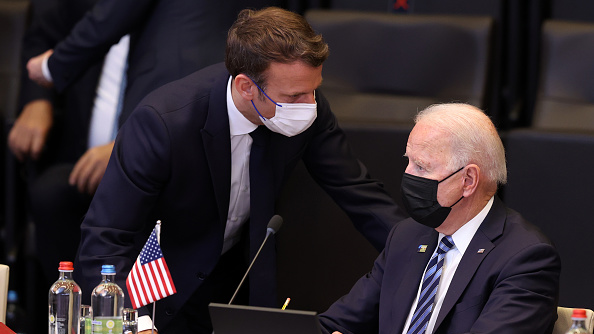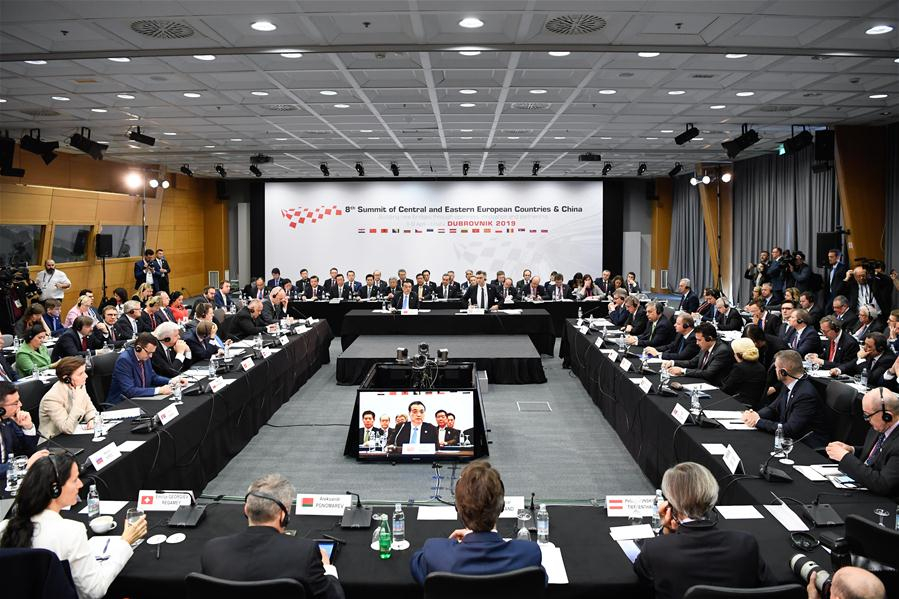
U.S. President Joe Biden (R) and French President Emmanuel Macron have a conversation ahead of the North Atlantic Treaty Organization (NATO) summit at the NATO headquarters in Brussels, Belgium, June 14, 2021. /Getty
U.S. President Joe Biden (R) and French President Emmanuel Macron have a conversation ahead of the North Atlantic Treaty Organization (NATO) summit at the NATO headquarters in Brussels, Belgium, June 14, 2021. /Getty
Editor's note: Azhar Azam works in a private organization as market and business analyst and writes about geopolitical issues and regional conflicts. The article reflects the author's opinions and not necessarily those of CGTN.
History tells America is an incredibly fatal and reliably opportunistic ally that "has no permanent friends or enemies, only interests." In May 2018, President of European Council Donald Tusk had to rail against the U.S. "capricious assertiveness" on issues including Iran, Gaza, tariffs and North Korea. "With friends like that (America), who needs enemies?"
The U.S. hits allies harder than its adversaries. Once a major non-NATO ally, Pakistan couldn't wipe the bitter memories of 480 U.S. drone strikes, the only time a country was attacked by its ally, killing more than 70,000 people and incurring economic losses of $150 billion. It's a warning for Australia that says the so-called AUKUS boosts its defense and regional security but in effect is ceding at-least some sovereignty to the U.S. and the UK.
America's lunatic frenemy policy toward its allies has once again pressed France to call out the U.S. and other two alliance states for "duplicity, contempt and lies" and stabbing in the back after the defense pact thwarted a $40 billion Canberra-Paris deal, signed in 2016 to build conventional submarines.
In 2015, European Commission President Jean-Claude Juncker blew the whistle for creation of a European Union (EU) army. However, the British government and politicians rejected his proposal, stating there was "no prospect" of such a formation and it would be detrimental to interests of the UK, NATO and the U.S. Still, France and Germany in 2018 cogitated for "a real, true European army" as Europeans couldn't trust the U.S. to defend them and times to rely on others had passed.
America's devious withdrawal from Afghanistan is again pushing the EU to "catalyze" its own permanent military force after Union's calls, to delay retreat from Kabul airport for safe evacuation of Europeans, fell on deaf ears in Washington. The changing perception is Europe backs the French President Emmanuel Macron's firm position that NATO was "brain dead" over waning commitment from its lead guarantor, the U.S.
One of the defining factors behind EU pursuit of autonomous defense has been the relentless criticism from the U.S. over burden-sharing costs. Washington's reproach can be traced back to 1953 when then-U.S. Secretary of State John Foster Dulles shocked his NATO allies by threatening to take up an "agonizing reappraisal" if it didn't contribute to the U.S. cold war policy.
Former U.S. President Donald Trump's full-throttled and parochial opposition to America's NATO allies – accusing Germany for being "captivated to Russia" and hammering France and other European countries over defense spending or trade deals – is only amongst many reasons for rupturing the transatlantic alliance.

Chinese Premier Li Keqiang attends the eighth leaders' meeting of China and Central and Eastern European Countries (CEEC) in Dubrovnik, Croatia, April 12, 2019. /Xinhua
Chinese Premier Li Keqiang attends the eighth leaders' meeting of China and Central and Eastern European Countries (CEEC) in Dubrovnik, Croatia, April 12, 2019. /Xinhua
Indeed, Washington has been downgrading Europe's strategic interests for 30 years since the end of the Cold War in wake of sharing the defense burden. The U.S. further restricted European access to America's U.S. market and technology, used International Traffic Arms Regulations to obstruct European competition in third-country markets and aggressively lobbied against EU efforts to develop an indigenous defense industrial and technology base.
A persistent trend of three decades where unvaryingly helped the U.S. to dominate international arms market at expense of the EU; never-ending obsessive tendency in the White House limited bloc's ability to raise its defense share, allowed Trump to bust the cracks in the relationship wide open and emboldened the U.S. President Joe Biden to reveal the painful truth about America's interests in the outdated NATO.
The head-scratching moment, thanks to the latest U.S.betrayal to the EU key member France, unclothed Washington's inner despair toward Brussels. This core driver of the U.S.' Europe policy received a poignant rebuke from the top EU leadership who put a punctuation mark on Biden's "America is back" and the U.S. "loyalty and transparency" and demanded an explanation.
Biden ditched NATO allies in Europe not just for he was disappointed with Brussels investment deal with Beijing or perception about France for being "too soft" on China. The U.S. disenchantment dates back to decades when Paris searched for Gaullist streak of complete independence and is sharpening with bloc's recent wish for strategic autonomy and greater global role, reluctance to circumvent confrontation in the Indo-Pacific and approach to see Beijing a cooperative and negotiating partner.
The "very belligerent" tripartite alliance of "English speaking countries" against China is designed to advance the U.S. unilateral interests and imperil peace and economy of the Indo-Pacific. Washington's all-or-nothing proposition is entirely different from Brussels that actively seeks cooperation with its economic and strategic partner, Beijing. Fed up with the U.S. bully of the Union, the EU is trying to draw its own map of trade and investment relationship and intending to pursue multifaceted engagement with the world's second-largest economy.
(If you want to contribute and have specific expertise, please contact us at opinions@cgtn.com.)

